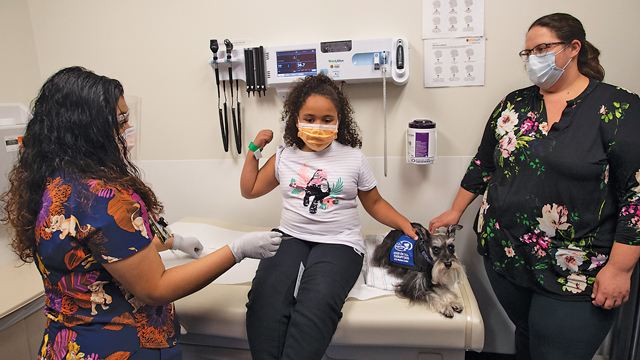Updated Friday, May 20
COVID-19 has taken center stage now for nearly two years – upending family routines, lives, and the world as we knew it. Nearly 140,000 Virginia children have tested positive for COVID-19, more than 1,000 of whom required hospitalization.
With everyone ages five and up now eligible for the vaccine, our shot at overcoming this coronavirus just got greater. If you have children in this newly eligible age group, I understand you may have questions. Here are some answers that I hope will help put your mind at ease.
1. Why do kids need the COVID-19 vaccine(s)?
While kids were spared for the most part early in the pandemic, they’ve made up a bigger percentage of new cases over the last few months. This makes sense; as more adults have been vaccinated, there aren’t as many places for the virus to go. Kids have been relatively unprotected until now, which means their immune systems were an easy target. The vaccine is the best defense we can provide our children against COVID-19.
Vaccination is also critical in preventing variants of the virus from emerging. Delta, which was prevalent this summer up through the fall, has been the most contagious yet. Now a new mutant, called Omicron, has emerged. We need to do everything in our power to keep the virus from mutating to new, even more dangerous variants.
To learn more about the COVID-19 booster shots for kids ages five to eleven, which is now available through the Richmond and Henrico Health District, go here.
In the U.S., 700 kids have died from COVID. This is 700 too many. This virus is here to stay, but through immunization we can turn COVID into one of the illnesses that kids don’t have to worry about anymore – like polio or smallpox. What a wonderful day that will be.
2. How do we know the COVID-19 vaccine is safe?
Before the U.S. Food and Drug Administration grants emergency use authorization, vaccines go through a rigorous series of trials. Vaccines are fully tested on
specific age groups for their unique stages of development. Emergency authorizations are granted for age groups only once the vaccines have proved to be safe and effective.
Amid the global pandemic, a lot of hard work went into developing these vaccines to help people across the world. The COVID-19 vaccines were developed rapidly not because corners were cut, but because they were a top priority with multiple federal partners working together to ensure they’re as safe as possible.
Fortunately, research on the COVID-19 vaccine didn’t have to start from scratch. The way the vaccine is made and the technology around messenger RNA vaccines have actually been studied for more than twenty years with other coronaviruses. Remember SARS and MERS? We took advantage of the previous studies and applied that knowledge to this coronavirus to develop a safe and effective vaccine in a relatively short period of time.
Messenger RNA (or mRNA) vaccines teach our cells how to make a protein that will trigger an immune response. That immune response produces antibodies to protect us in the event the real virus enters our bodies. The vaccine itself does not contain germs, and it doesn’t affect or interact with the body’s DNA in any way.
The side effects of the vaccine have been mild and thoroughly examined. In the trials, which included approximately 3,000 children, fatigue was the most common side effect, with about 30 percent of kids experiencing it to some degree. Approximately 20 percent of children developed a headache following the vaccine, which was easily resolved with over-the-counter pain relievers. Fewer than 10 percent got muscle aches, and fewer than 5 percent experienced joint pain, chills, or fever. This is very similar to what we’ve seen in adults, and mild responses like these are a sign the body is responding to the vaccine and building protection, which is exactly what we want it to do.
3. Does it really work?
The Pfizer vaccine proved to be over 90 percent effective at preventing coronavirus infection in kids ages five to eleven. This is with the mRNA dose at one-third of the adult dose. This smaller vaccine dose was determined to provide the best balance between safety and immunogenicity (or ability to cause a protective immune response) in children in this age group.
When it comes to the Delta variant, the vast majority of people who have required hospitalization and intubation have been unvaccinated. While a small percentage of vaccinated individuals are still getting COVID-19, they have been almost entirely spared hospitalization and severe disease.
The vaccine works.
4. What will the vaccine mean for my child?
Aside from protecting them from severe illness and potential hospitalization, the vaccine brings promise for kids. Children in second grade and younger have yet to have a traditional school year without thoughts of masking, avoiding close contact, quarantining, and distance learning. Now that the eligible population has expanded to those ages five and up, nearly all grade school children have access to this potentially life-saving protection. As more children get vaccinated, they’ll be able to safely attend school, childcare, and extracurricular activities. These in-person experiences and opportunities are what childhood is all about.
Having children vaccinated also gives you more freedom to consider visiting safely with older family members and traveling to visit friends and family as the new year unfolds.
5. What if I’m still not sure about getting my child vaccinated?
It’s normal to have hesitancies when you haven’t done something before – like having your child vaccinated for a new disease. If you see or hear something that’s concerning on social media or elsewhere, bring it to your child’s pediatrician for trusted, accurate answers. As healthcare providers, we want to have these discussions with you and help you make the best decisions for your child and family.




